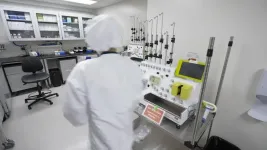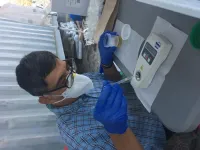(Press-News.org) NOTE TO EDITORS: High-resolution b-roll, soundbites and images are available for download at https://bit.ly/3PfnX5Y
COLUMBUS, Ohio – A new cancer treatment that uses a person’s own immune cells has been approved by the U.S. Food and Drug Administration (FDA) for treating the most dangerous type of skin cancer. Now this form of cellular therapy (tumor-infiltrating lymphocyte – or TIL therapy) is showing promise in advanced lung cancers through clinical trials underway at The Ohio State University Comprehensive Cancer Center – Arthur G. James Cancer Hospital and Richard J. Solove Research Institute (OSUCCC – James).
Giving immune system cancer-attacking power back
For a cancerous tumor to grow, it must overpower immune cells known as T cells. TIL therapy restores the immune system’s natural ability to fight cancer cells.
“T cells are major cancer-attacking immune cells. But we think they might not be robust enough to completely block and destroy the cancer; that's why cancer grows. TIL therapy shifts the power back to the immune system to overcome the abnormal microenvironment inside a tumor that allows the cancer to grow unchecked by the immune system,” said Kai He, MD, PhD, a thoracic medical oncologist and physician-scientist with Pelotonia Institute for Immuno-Oncology at the OSUCCC – James.
Unlike some other cellular therapy techniques such as CAR T-cell therapy, however, TIL cells are not genetically re-engineered. Instead, specific immune-fighting T cells are extracted from the patient and grown from a few dozen immune cells to billions of cancer-blasting immune cells in a lab and then infused back into the patient. This new army of healthy immune cells can then take hold in the body and target the cancer.
To prep for this therapy, patients receive a one-time chemotherapy treatment to clear out unhealthy T cells and create space for the new TIL T cells to take root.
First TIL therapy for advanced melanoma FDA-approved
In February, the company Iovance received the first FDA approval of a TIL therapy product for metastatic melanoma. Working with Iovance, trials led in partnership by OSUCCC – James physician-scientists Richard Wu, MD, Joel Beane, MD, Kari Kendra, MD, PhD, Claire Verschraegen, MD and Dr. He provided essential clinical data that supported this approval. The OSUCCC – James Cellular Therapy Program is investigating TIL therapy for the treatment of other solid tumors, including lung and cervix cancers, as well as sarcoma and others. The team consists of scientists and physicians from various departments/divisions at OSU, including medical oncology, hematology, surgical oncology, pathology and others.
“Our goal is to give the most robust treatment early in the process to maximize benefit and increase chances of cancer control. It is very exciting to see TIL clinical trials producing complete responses in patients with stage 4 cancers with no evidence of disease afterward, especially in difficult-to-treat diseases like lung cancer and metastatic melanoma,” said Dr. He.
The team is working to produce novel TIL therapy products in-house at Ohio State for the treatment of lung and other solid tumors at the hospital’s 2,500-square-foot cell therapy manufacturing facility.
To learn more about treatment and research at the OSUCCC – James, visit cancer.osu.edu or call 1-800-293-5066.
###
END
Cell therapy approach harnesses the immune system in a different way to stop cancer
TIL therapy is showing promise in advanced lung cancers through clinical trials underway at The Ohio State University Comprehensive Cancer Center – Arthur G. James Cancer Hospital and Richard J. Solove Research Institute (OSUCCC – James).
2024-03-19
ELSE PRESS RELEASES FROM THIS DATE:
Artificial intelligence algorithms for understanding the determinants of oral health
2024-03-19
Alexandria, VA, USA – A study aiming to use AI and predictive models to forecast the likelihood of permanent tooth loss, as an indicator of overall oral health, based on various behavioral and lifestyle factors was presented at the 102nd General Session of the IADR, which was held in conjunction with the 53rd Annual Meeting of the American Association for Dental, Oral, and Craniofacial Research and the 48th Annual Meeting of the Canadian Association for Dental Research, on March 13-16, 2024, in New Orleans, LA, USA.
The abstract, “Artificial Intelligence Algorithms for Understanding the Determinants of Oral Health” was presented during ...
Predicting oral cancer-related mortality among adults using machine learning approach
2024-03-19
Alexandria, VA, USA – A study aiming to predict oral cancer-related mortality among adults in the United States and identify the predictors of oral cancer-related mortality using the Machine Learning Approach. was presented at the 102nd General Session of the IADR, which was held in conjunction with the 53rd Annual Meeting of the American Association for Dental, Oral, and Craniofacial Research and the 48th Annual Meeting of the Canadian Association for Dental Research, on March 13-16, 2024, in New Orleans, LA, USA.
The abstract, “Predicting Oral Cancer-Related Mortality among Adults Using Machine Learning Approach” was presented ...
Harnessing biomaterial-based FTY720 immunotherapy to accelerate oral wound healing
2024-03-19
Alexandria, VA, USA – A study aiming to deliver Fingolimod (FTY720) loaded polymer scaffolds to enhance oral wound healing by modulating pro-regenerative immune cell migration associated with improved vascularization and tissue remodeling was presented at the 102nd General Session of the IADR, which was held in conjunction with the 53rd Annual Meeting of the American Association for Dental, Oral, and Craniofacial Research and the 48th Annual Meeting of the Canadian Association for Dental Research, on March 13-16, 2024, in New Orleans, LA, USA.
The abstract, “Harnessing Biomaterial-Based ...
Oral health behaviors associated with mental health disorders
2024-03-19
Alexandria, VA, USA – A study aiming to examine oral hygiene self-care behavior among patients with self-reported mental health disorders was presented at the 102nd General Session of the IADR, which was held in conjunction with the 53rd Annual Meeting of the American Association for Dental, Oral, and Craniofacial Research and the 48th Annual Meeting of the Canadian Association for Dental Research, on March 13-16, 2024, in New Orleans, LA, USA.
The abstract, “Oral Health Behaviors Associated with Mental Health Disorders” was presented during the ...
Researchers develop deep learning model to predict breast cancer
2024-03-19
OAK BROOK, Ill. – Researchers have developed a new, interpretable artificial intelligence (AI) model to predict 5-year breast cancer risk from mammograms, according to a new study published today in Radiology, a journal of the Radiological Society of North America (RSNA).
One in 8 women, or approximately 13% of the female population in the U.S., will develop invasive breast cancer in their lifetime and 1 in 39 women (3%) will die from the disease, according to the American Cancer Society. Breast ...
Social activities can prevent cognitive decline in care facility residents
2024-03-19
Social activities such as interactions with others and participation in organised events can prevent cognitive decline in long-term care facility. Research from Amsterdam UMC, carried out among 3600 patients in 42 Dutch and Belgian care homes, shows that participation in social activities offers a protective effect for those with no, or little, cognitive impairment. These results are published today in the Journal of Alzheimer's Disease.
"Cognitive decline in long-term care residents is relatively common, a Canadian study showed that almost a quarter of residents cognitively declined after a year of residency," ...
BU study finds coping is related to longevity in older men
2024-03-19
(Boston)—Coping is defined as cognitive and behavioral efforts to manage stressors that people believe exceed their ability and resources to respond to effectively. While previous research has linked stressor characteristics, such as the type of event and its duration, and how stressed people feel in response to them, to higher mortality risk, far fewer studies have considered the long-term health consequences of how we manage stressors (coping) in large-scale studies.
In a new study from ...
MRI and lumbar puncture not necessarily required to manage CAR T-cell therapy complications
2024-03-19
(WASHINGTON, March 19, 2024) – Magnetic resonance imaging (MRI) and lumbar puncture (LP) may not always be necessary for diagnosing and managing a serious neurological complication associated with CAR T-cell therapy, according to a new Blood Advances study. Findings further validated the use of the electroencephalogram (EEG) – a noninvasive test measuring electrical activity in the brain – in managing this neurotoxicity.
“When treating patients for CAR T-cell associated toxicities, we typically follow pretty ...
Empty “backpacks” activate the immune system against cancer
2024-03-19
Most of the white blood cells in your body are a type of cell called neutrophils. Despite their high numbers, they are less well understood than other immune cells, in part because they have very short lifespans: an average neutrophil lives for only eight hours. However, recent work has shown that neutrophils are very flexible cells, capable of dialing inflammation up or down, especially in the context of cancer. This makes them attractive targets for immunotherapy, which aims to tweak the immune system to more potently attack disease. But neutrophil-based ...
Dehydration is rampant among Florida farm workers, new study shows
2024-03-19
Nearly all farm workers who participated in a recent study in Florida were dehydrated at the end of their shifts, and more than half were still dehydrated the following morning.
The study, a partnership between the University of Illinois Chicago and the Farmworker Association of Florida, used urine samples collected first thing in the morning, at lunch and at the end of a shift to assess the risk of dehydration over five days in May 2021 and May 2022 at a vegetable farm in southern Florida. A total of 111 workers, most of them men from Mexico and Guatemala, participated in the study, which is published in the journal ...
LAST 30 PRESS RELEASES:
Scientists show how to predict world’s deadly scorpion hotspots
ASU researchers to lead AAAS panel on water insecurity in the United States
ASU professor Anne Stone to present at AAAS Conference in Phoenix on ancient origins of modern disease
Proposals for exploring viruses and skin as the next experimental quantum frontiers share US$30,000 science award
ASU researchers showcase scalable tech solutions for older adults living alone with cognitive decline at AAAS 2026
Scientists identify smooth regional trends in fruit fly survival strategies
Antipathy toward snakes? Your parents likely talked you into that at an early age
Sylvester Cancer Tip Sheet for Feb. 2026
Online exposure to medical misinformation concentrated among older adults
Telehealth improves access to genetic services for adult survivors of childhood cancers
Outdated mortality benchmarks risk missing early signs of famine and delay recognizing mass starvation
Newly discovered bacterium converts carbon dioxide into chemicals using electricity
Flipping and reversing mini-proteins could improve disease treatment
Scientists reveal major hidden source of atmospheric nitrogen pollution in fragile lake basin
Biochar emerges as a powerful tool for soil carbon neutrality and climate mitigation
Tiny cell messengers show big promise for safer protein and gene delivery
AMS releases statement regarding the decision to rescind EPA’s 2009 Endangerment Finding
Parents’ alcohol and drug use influences their children’s consumption, research shows
Modular assembly of chiral nitrogen-bridged rings achieved by palladium-catalyzed diastereoselective and enantioselective cascade cyclization reactions
Promoting civic engagement
AMS Science Preview: Hurricane slowdown, school snow days
Deforestation in the Amazon raises the surface temperature by 3 °C during the dry season
Model more accurately maps the impact of frost on corn crops
How did humans develop sharp vision? Lab-grown retinas show likely answer
Sour grapes? Taste, experience of sour foods depends on individual consumer
At AAAS, professor Krystal Tsosie argues the future of science must be Indigenous-led
From the lab to the living room: Decoding Parkinson’s patients movements in the real world
Research advances in porous materials, as highlighted in the 2025 Nobel Prize in Chemistry
Sally C. Morton, executive vice president of ASU Knowledge Enterprise, presents a bold and practical framework for moving research from discovery to real-world impact
Biochemical parameters in patients with diabetic nephropathy versus individuals with diabetes alone, non-diabetic nephropathy, and healthy controls
[Press-News.org] Cell therapy approach harnesses the immune system in a different way to stop cancerTIL therapy is showing promise in advanced lung cancers through clinical trials underway at The Ohio State University Comprehensive Cancer Center – Arthur G. James Cancer Hospital and Richard J. Solove Research Institute (OSUCCC – James).


